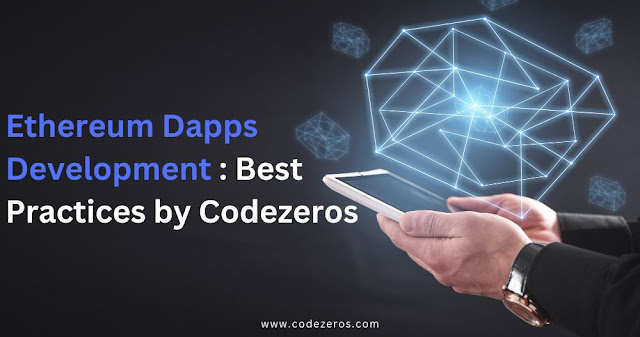Ethereum, the world's leading smart contract platform, has paved the way for a new era of decentralized applications (Dapps). These applications leverage the blockchain to offer transparency, security, and trust, but developing them is no walk in the park. To create Ethereum Dapps that are not only functional but also robust, it's essential to follow best practices. In this article, we will explore some of the key best practices for Ethereum Dapps development, as advocated by Codezeros, a company specializing in blockchain solutions.
- Clear and Detailed Smart Contract Design:
Smart contracts are at the core of Ethereum Dapps, and their design is pivotal. Codezeros stresses the importance of clear and detailed smart contract design that encompasses the contract's purpose, data structures, functions, and events. This clarity not only makes development more straightforward but also aids in the contract's future maintenance and upgradeability.
- Use of Standard Libraries and Frameworks:
Ethereum Dapp development can be complex, but Codezeros recommends simplifying it by leveraging standard libraries and frameworks. OpenZeppelin, for example, provides pre-audited and standardized smart contract templates, reducing the risk of coding errors and vulnerabilities. Using such libraries can save time and enhance security.
- Testing and Testnets:
Codezeros emphasizes the significance of thorough testing. Ethereum's testnets, such as Ropsten and Rinkeby, are invaluable for testing Dapps before deploying them to the mainnet. Rigorous testing helps identify and rectify issues, ensuring that your Dapp behaves as expected and is free from vulnerabilities.
- Gas Optimization:
Ethereum transactions consume gas, which equates to fees. Inefficient code can result in high gas costs for users of your Dapp. Codezeros recommends optimizing smart contracts to minimize gas consumption while maintaining functionality. Efficient code benefits both your Dapp's performance and user experience.
- Error Handling and Fail-Safe Mechanisms:
Errors are inevitable in any software development project. Codezeros advises the incorporation of comprehensive error-handling mechanisms and fail-safes in Ethereum Dapps. This includes setting up mechanisms to pause or halt the Dapp in emergencies, preventing potential exploitation of vulnerabilities.
- Upgradeability Considerations:
Ethereum smart contracts are immutable once deployed to the mainnet. Codezeros suggests planning for contract upgradeability by creating upgradable contracts. These allow you to fix vulnerabilities or introduce new features without redeploying the entire contract.
- Security Auditing:
Codezeros strongly recommends having your smart contracts audited by professionals. Third-party audits identify vulnerabilities and coding errors that may not be apparent during development. It instills trust in your Dapp's users and investors, demonstrating a commitment to security.
- Multi-Signature Wallets:
Incorporate multi-signature wallets for critical functions in your Dapp. Multi-signature wallets require multiple parties to approve a transaction, enhancing security by eliminating the risk of a single point of failure. Codezeros advises this for any operation involving user assets or sensitive data.
- Access Control:
Implement robust access control mechanisms in your smart contracts. Ensure that only authorized users or other smart contracts can interact with sensitive functions and data. Restricting access is fundamental to preventing unauthorized actions that could compromise security.
- Documentation:
Proper documentation is often overlooked but is a vital part of Ethereum Dapp development. Codezeros emphasizes the importance of maintaining comprehensive documentation for your code, enabling other developers to understand and contribute to your project. Well-documented code is easier to maintain and scale.
In conclusion, Ethereum Dapp development can be a complex and challenging undertaking, but following best practices is essential to creating secure and reliable applications. Codezeros, with its expertise in blockchain solutions, advocates a holistic approach to Dapp development that covers everything from smart contract design and efficient coding to thorough testing and security audits. By adhering to these best practices, Ethereum Dapp developers can not only ensure the functionality of their applications but also protect user assets and maintain the trust of their Dapp's user base in the dynamic world of blockchain technology.

Comments
Post a Comment